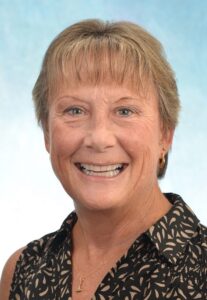Deborah Thorpe, PT, PhD retired from her position as professor in the Division of Physical Therapy in the Department of Allied Health Sciences in August 2021.
Thorpe steps down after nearly 22 years with UNC School of Medicine. She joined the faculty in 1999 as an assistant professor with a specialization in pediatric physical therapy, choosing UNC over offers from both Elon University, the University of New England, and The Ohio State University. She rose to associate professor in 2007 and later professor in 2018 while also serving as an adjunct professor in the UNC department of Exercise and Sport Science.
“I love the UNC faculty and this program, and the ability to teach in a small class setting,” Thorpe said. “This is truly what drew me in and kept me here all these years.”
Thorpe’s research has focused on children and adults with developmental disabilities, specifically cerebral palsy. She received numerous grants and awards, including a 5-year K23 award from the National Institute of Health which enabled her to pursue full-time research into aging with cerebral palsy and the development of aquatic rehabilitation interventions for individuals with cerebral palsy. Her publications from this study – the only one of its kind at UNC – and multiple pediatric studies, led to national and international recognition and collaboration.
In addition to clinical care, Thorpe has continued publishing her research throughout her career, notably with studies on bone density and the development of bone scan techniques for adults with cerebral palsy. More recently, Thorpe has pioneered data and statistics research through a grant awarded by the APTA, Center for Health Statistics, Training and Research. Through this grant, Thorpe has become one of the first researchers to analyze Medicare data specific to adults with cerebral palsy. With these results, she and her co-investigators hope to show that provision of physical therapy services should occur throughout the lifespan of individuals with cerebral palsy.
“Cerebral palsy is not a highly studied disorder and has a very heterogeneous presentation,” Thorpe said. “Individuals with cerebral palsy are now living longer than ever before, and I’m very passionate about my work because I want to be a voice to advocate for these patients and their need for better treatment options as they age.”
Collaborating with UNC’s Chair of the Department of Physical Medicine and Rehabilitation, Joshua Alexander, MD, Thorpe has worked for many years to develop a multidisciplinary clinic to transition children with developmental disabilities into adult care for rehabilitation services.
“Many patients get great care until they’re 18, and then afterward they don’t have the same support,” Thorpe said. “Many providers won’t see them because they are not trained in the issues faced by adults with cerebral palsy. It’s been a career goal of mine to change this – we have more work to do to understand this disorder as it relates to older age.”
Thorpe’s work and publications have opened up additional grant opportunities for UNC and led to her leadership on national and international research groups, including the Cerebral Palsy Research Network. She has worked to include UNC in a national registry for individuals with cerebral palsy with a goal of ensuring that future young researchers studying cerebral palsy will have access to thousands of data points, patients and statistics through medical records and national interdisciplinary collaboration.
Thorpe plans to continue guest lectures at UNC after her retirement, as well as providing physical therapy services to group homes and retirement communities throughout the area. She is an avid golfer and fly fisher and has a sixteen-year-old daughter who she knows will keep her busy with equestrian events and college tours.
To honor Thorpe’s retirement, UNC Health Foundation has set up a tribute site where you can make a secure online gift and share your appreciation. Click here to make a gift.
-Written by Katie Nash, UNC Health Foundation
